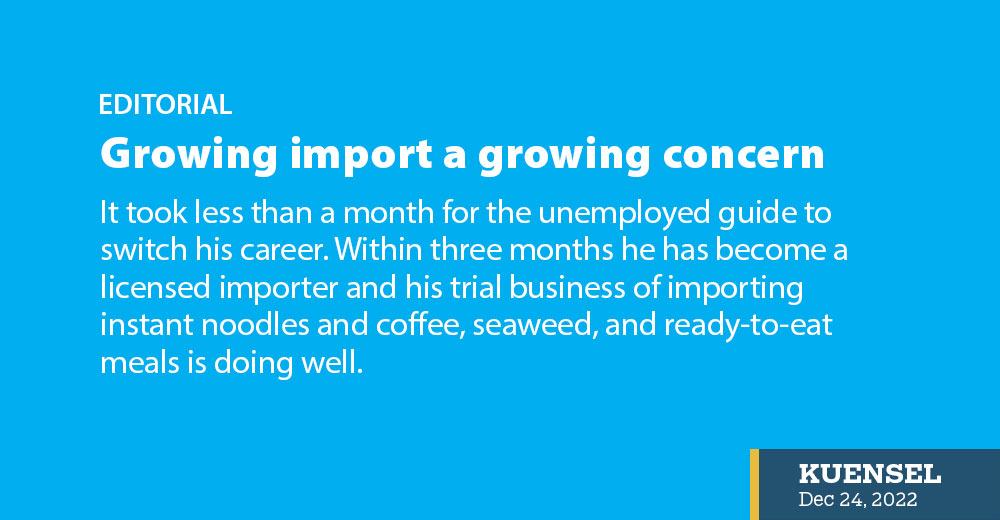It took less than a month for the unemployed guide to switch his career. Within three months he has become a licensed importer and his trial business of importing instant noodles and coffee, seaweed, and ready-to-eat meals is doing well.
The guide is among the many in the import business, also called as “container business,” making quick money – bringing in goods ranging from instant noodles to furniture and furnishings from as far as China, South Korea, and Indonesia. There is money in the import business. However, it is leaving a huge impact on the country.
To put into context, what the country imported in nine months this year has surpassed the import of 2021. The import, according to the Prime Minister’s state of the nation’s report, is an increase of 46.2 percent compared to the same period. The massive import is widening the already negative trade balance. Our trade deficit, including electricity, stood at Nu 48.14B as of September this year. It is an increase of Nu 15.9B from the previous year.
Like the Prime Minister said, there is hardly any value addition to Bhutan’s exports while all the imports are finished goods. This is adding to the deficit even if we can increase our exports.
Should import be controlled?
As an import-driven country, we will have to import. Apart from some minerals, cash crops and electricity, our exports are limited. On the other hand, we import almost everything that is on our plate, what we wear every day, what is in our offices, homes and even electricity during lean season.
We cannot ban imports, but it is high time to look into what we import. If the huge import bill is draining hard currency and INR, most of what we import is junk contributing to the increasing cases of non-communicable diseases. Our main export, electricity, cannot foot the import bill of fossil fuel. The trade deficit without electricity with India amounted to Nu 66.53B as of September.
Is it then wise to reduce tax on third country imports if they are non-essentials? Is it not wise to regulate some items from Bangkok or China whose price is unregulated and burdening the hard currency reserves? There are food items and other goods that we cannot help but import. But wise policies could curtail or restrict the free flow of some items like alcohol and beverages, packaged foods or those that come with health hazards. The biggest burden on our health system is from lifestyle related diseases. The choice of food is one factor.
The other way to curb import is growing or producing our own. We are an agrarian society, yet rice, our staple food, was one of the top 10 import commodities, amounting to about Nu 2.18B in expenditure. Bhutan was never rice self-sufficient, but the volume we import is because we stopped growing or what we grow is too expensive for the masses.
Right policy interventions could help here. Farmers are complaining of shortage of hands to grow rice, yet mechanising farming is not keeping up with the rural-urban migration rate. Wildlife predation is another and we have not found a solution. Local products are not affordable as pricing is left to the whims of the middlemen.
Value addition to our exports could improve our exports and offset the trade deficit, but this is missing. It is ironic that Bhutan exports oranges to Bangladesh and imports orange squash. We export potatoes to India and import potato chips! Restricting import of certain items may be against the free trade arrangements, but being responsible importers can help.
There are no alternatives to the import of fossil fuel. But there are many other goods.


